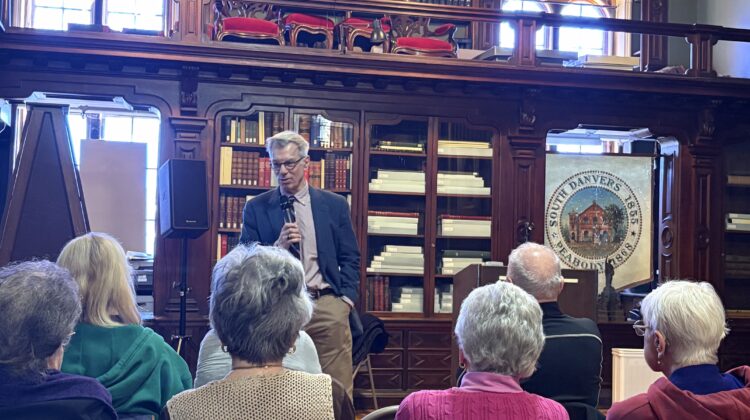PEABODY — Over the course of four weeks, local scholars are getting the opportunity to engage in discussion led by Harvard literature professor Theo Theoharis about how writers have borne witness to the Holocaust.
Two classes have already been held the past two Wednesdays in the Sutton Room of the Peabody Institute Library, the first centered on “Night” by Elie Wiesel and the second on “The Deputy” by Rolf Hochhuth.
His relationship with the institution stretches back 20 years, with previous series Theoharis has led at the library including one on Herman Melville’s “Moby-Dick” and another on Frederick Douglass, who once spoke at the library.
“Theo has a charismatic personality, a unique taste in books and plays, and encourages class participation,” Senior Adult Services and Programming Librarian Gabi Toth said. “Patrons have described this program to me as ‘like being back in high school English class as an adult.’”
His twice-a-year lectures have continuously brought back familiar faces to the Sutton Room in search of more scholarly dialogue with the professor and their fellow academics.
“Mostly I do small little lectures. I comically refer to them as arias. I’ll tell them ‘For a few minutes, I’m going to aria on this because it has information relevant to our discussions,” Theoharis said. “And people from all walks of life come. There’s one guy who’s come for years and years, and he’s in his 90s now, but he’s come regularly.”
This spring’s course, the topic of which Toth requested personally, and the conversations it is spurning are particularly affecting.
“We read these books to bear witness to what happened, and because representation matters. Part of the Peabody Library’s legacy lies with Peabody resident and survivor Sonia Schrieber Wietz,” Toth said. “She survived when her parents didn’t, and ‘promised I would tell.’ She set up a Holocaust research center in the library (it now resides at Salem State) while she was alive, but since she passed on, I like to honor her promise via planning programming and book groups.”
Theoharis’ first class in the series started with traveling back to ancient Greek for a quick etymology lesson on the words martyr, Holocaust, and testify.
“Testify, comes in English, from the oath of Abraham and Isaac… All those texts say,
Abraham put his hand on his thigh. That’s not where he put his hand. He put his hand on his testicles swearing by the source of life in him,” Theoharis said during the lecture. “That’s what ‘testify’ means there, right? It means to invoke that divine authority in your behavior.”
For the next hour and half, the discussion covered the Irish Potato Famine, James Joyce, the Declaration of Independence, and, of course, Wiesel’s testimony of losing his faith while living in the Nazi concentration camps.
The result is lively and varied conversation from an engrossed audience of people invested purely in the intellectual stimulation.
“If you spontaneously every now and then, add a new frame or a new context, there are some people in the room who are going to enter through that context who couldn’t get in through any other ones,” he said. “There are a lot of people with jobs and retired people and all that, but there are no undergraduate or graduate students there. The kind of conversation that benefits undergraduates and graduate students rarely happens at the Peabody Institute.”
Questions asked by audience members were never easy to answer, as they contemplated multifaceted discussions like the definition of genocide and how modern society speaks about the Holocaust.
Theoharis expects the remaining two lessons on Wednesday, Apr. 2 and Wednesday, Apr. 9, will carry similar heavy lines of questioning and deep reflection on the reading material.
“They make you question your loyalty to the institutions and your complicity in their misbehavior. That’s an experience everybody has always had at work, with their church, in their marriage,” Theoharis said. “Can you leave them? What does it cost to leave them? What does it cost to stay in them? So all those kinds of questions are treated in all the Holocaust literature we’re reading.”
To participate in the final two discussions Theoharis is leading, sign-up at https://peabodylibrary.org/calendar/.

